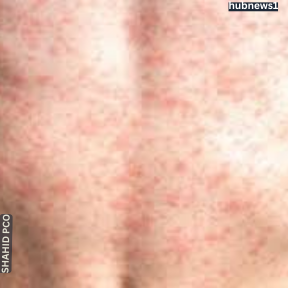
Measles Cases in Kansas May Be Linked to Texas Outbreak
Measles Cases in Kansas May Be Linked to Texas Outbreak, a highly contagious viral disease once considered eliminated in the U.S., is making headlines again. Health officials in Kansas are investigating several measles cases that may be connected to a larger outbreak in Texas. This development has raised concerns among public health experts, who warn that declining vaccination rates and increased travel could lead to more outbreaks.
In this article, we’ll break down what’s happening, why measles is dangerous, and how you can protect yourself and your family.
What’s Happening in Kansas and Texas?
Recently, Kansas health officials reported multiple confirmed measles cases, with possible ties to an ongoing outbreak in Texas. The Texas outbreak began in a community with low vaccination rates, and the virus has since spread to neighboring states.
Measles spreads easily through coughing and sneezing, and the virus can linger in the air for up to two hours after an infected person leaves the area. Because of this, even brief exposure in places like airports, schools, or shopping centers can lead to new infections.
Health departments in both states are working to identify and notify people who may have been exposed. They’re also urging unvaccinated individuals to get the measles-mumps-rubella (MMR) vaccine as soon as possible.
READ MORE: Measles outbreak sparks vaccine enthusiasm across the country
Why Is Measles So Dangerous?
Many people think of measles as just a rash and fever, but it can lead to severe complications, especially in young children, pregnant women, and those with weakened immune systems. Some potential complications include:
- Pneumonia – A leading cause of measles-related deaths in young children.
- Encephalitis (brain swelling) – Can cause permanent brain damage.
- Severe dehydration – Due to high fever and diarrhea.
- Premature birth or low birth weight – In pregnant women who contract measles.
Before the measles vaccine was introduced in the 1960s, the U.S. saw 3 to 4 million cases each year, with hundreds of deaths. Widespread vaccination brought cases down dramatically, but recent declines in immunization rates have allowed the virus to resurge.
How Measles Spreads (And Why It’s So Contagious)
Measles is one of the most infectious diseases known—even more so than COVID-19 or the flu. Here’s why:
- Airborne transmission – The virus can stay in the air for hours.
- High contagion rate – If one person has measles, up to 90% of unvaccinated people nearby will also get infected.
- Long infectious period – People can spread measles for four days before the rash appears and up to four days after.
This makes containment difficult, especially in places where people gather, like schools, daycares, and airports.
The Importance of the MMR Vaccine
The best way to prevent measles is through vaccination. The MMR vaccine (which protects against measles, mumps, and rubella) is 97% effective after two doses.
Key Vaccine Facts:
✅ Safe & effective – Decades of research support its safety.
✅ Recommended for children – First dose at 12-15 months, second dose at 4-6 years.
✅ Adults may need a booster – If you’re unsure about your vaccination status, check with your doctor.
✅ Travel requirement – Many countries require proof of measles vaccination for entry.
Despite myths linking the MMR vaccine to autism, numerous studies have debunked this claim. The real risk comes from not vaccinating, which leaves individuals and communities vulnerable.
What Should You Do?
If you live in Kansas, Texas, or nearby states, here are some steps to stay safe:
- Check Your Vaccination Status
- If you’ve had two doses of MMR, you’re likely protected.
- If you’re unsure, ask your doctor for a blood test to check immunity.
- Watch for Symptoms
- High fever
- Cough, runny nose, red eyes
- Rash (starts on face, spreads downward)
- If symptoms appear, call your doctor before visiting to avoid exposing others.
- Limit Exposure if Unvaccinated
- Avoid crowded places if measles is spreading in your area.
- Postpone travel to outbreak zones if you or your child aren’t vaccinated.
- Spread Awareness, Not the Virus
- Encourage friends and family to check their vaccine records.
- Share reliable health information to counter misinformation.
The Bigger Picture: Why Measles Is Coming Back
Measles was declared eliminated in the U.S. in 2000, but imported cases (from travelers) and declining vaccination rates have led to new outbreaks. Some reasons for the resurgence include:
- Vaccine hesitancy – Misinformation has led some parents to delay or skip vaccines.
- Global travel – Measles is still common in parts of Europe, Asia, and Africa, and unvaccinated travelers can bring it back.
- Pandemic disruptions – Many children missed routine vaccinations during COVID-19 lockdowns.
Public health officials stress that high vaccination rates (95% or more) are needed to prevent outbreaks. When vaccination drops, even by a small percentage, measles can quickly take hold.

Final Thoughts: Stay Informed, Stay Protected
Measles is preventable, but it requires community effort. If you or your children are unvaccinated, now is the time to act. Vaccination protects not just you but also those who can’t get the vaccine—like infants and immunocompromised individuals.
Let’s work together to keep measles outbreaks under control. Check your vaccine records, talk to your doctor, and help spread facts—not fear.
Stay safe and healthy!
Sources:
- Centers for Disease Control and Prevention (CDC)
- Kansas Department of Health and Environment
- Texas Department of State Health Services
- World Health Organization (WHO)
Would you like more details on vaccination clinics in your area? Let us know in the comments!
READ MORE: WHO alert on US measles outbreak adds new genetic details
FAQ:
1. What’s happening with measles in Kansas and Texas?
Health officials in Kansas are investigating several confirmed measles cases that may be connected to an ongoing outbreak in Texas. The outbreak started in a community with low vaccination rates, and the highly contagious virus has now potentially spread across state lines.
2. How does measles spread?
Measles is extremely contagious and spreads through:
- Airborne transmission (coughing, sneezing)
- Direct contact with an infected person
- Touching contaminated surfaces (the virus can live in the air for up to 2 hours)
3. What are the symptoms of measles?
Symptoms usually appear 7–14 days after exposure and include:
✔ High fever
✔ Cough, runny nose, red/watery eyes
✔ A red rash (starts on the face, spreads to the rest of the body)
4. How serious is measles?
While some cases are mild, measles can lead to severe complications, especially in:
- Babies and young children
- Pregnant women
- People with weakened immune systems
Possible complications:
- Pneumonia
- Encephalitis (brain swelling)
- Severe dehydration
- Premature birth (in pregnant women)
5. How can I protect myself and my family?
✅ Get vaccinated – The MMR vaccine (measles, mumps, rubella) is 97% effective after two doses.
✅ Check your vaccination records – If unsure, ask your doctor for a blood test to confirm immunity.
✅ Stay alert for symptoms – If you suspect measles, call your doctor before visiting to avoid exposing others.
6. Who should get the MMR vaccine?
- Children: First dose at 12–15 months, second dose at 4–6 years.
- Adults: If you were born after 1957 and haven’t had two doses, you may need a booster.
- Travelers: Many countries require proof of measles vaccination.
7. Is the MMR vaccine safe?
Yes. Extensive research over decades confirms its safety. The false link to autism has been completely debunked. The real danger is not getting vaccinated.
8. What should I do if I’ve been exposed?
- If vaccinated, your risk is very low.
- If unvaccinated, contact a healthcare provider immediately—you may need post-exposure treatment.
- Monitor for symptoms for 21 days after exposure.
9. Why is measles coming back?
Measles was eliminated in the U.S. in 2000, but outbreaks are increasing due to:
- Declining vaccination rates
- International travel (imported cases)
- Pandemic-related missed vaccinations
10. Where can I get more information?
Stay informed, stay protected, and help stop the spread!
measles,measles outbreaks in the 21st century,measles outbreak,measles outbreak vaccinations,disneyland measles outbreak,outbreak,measles (disease or medical condition),measles outbreak spreads,california measles outbreak,measles outbreak anti-vaccination movement,measles cases,measles vaccine,kansas,kansas city,measles immunisation,measles symptoms,measles disneyland,measles vaccination,the measles,best news analysis in youtube upsc,measles virus






